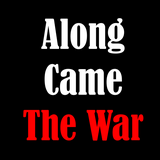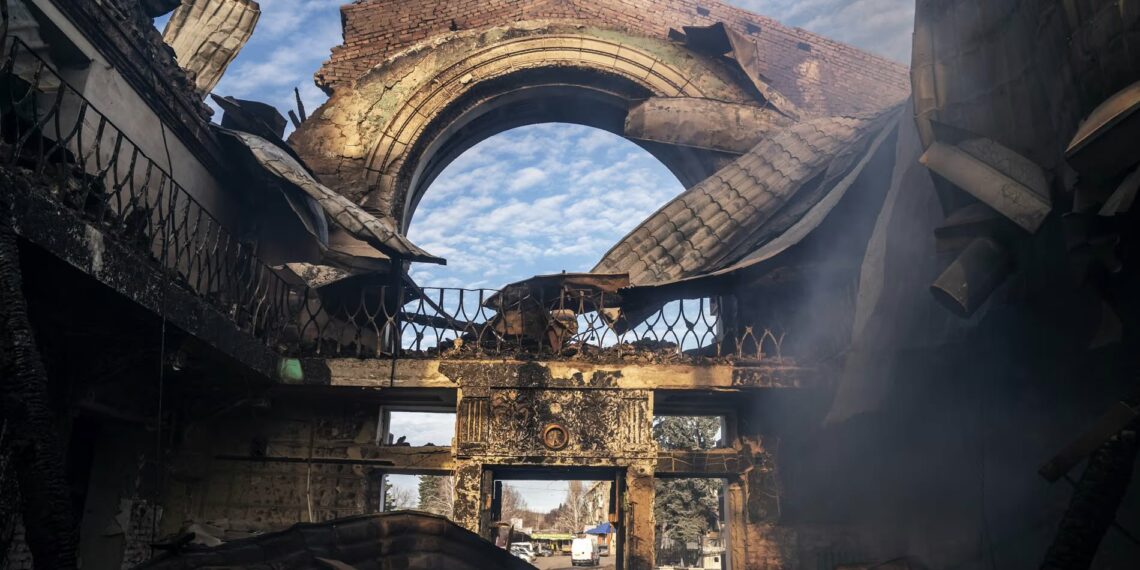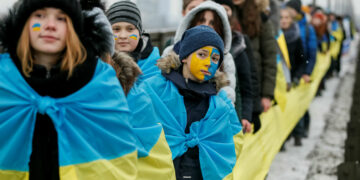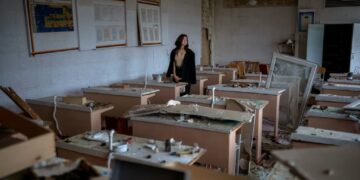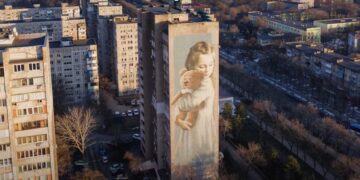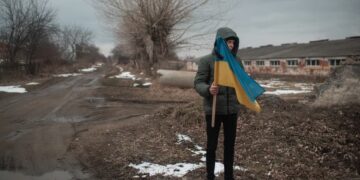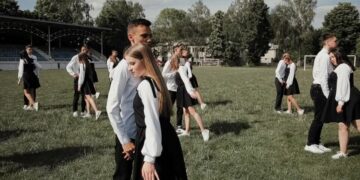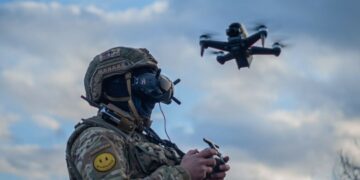Students from the prestigious Kyiv-Mohyla Academy share their raw, personal accounts of February 24, 2022 – the morning that forever divided their lives into “before” and “after.” From the initial shock of air raid sirens and distant explosions to the emotional transformation they’ve undergone in three years of war, these young Ukrainians offer powerful testimony to both the trauma of invasion and the resilience of a generation coming of age during their nation’s darkest hour.
Yulia Samoilenko:
Henichesk 24.02.2022
February 24 began in a special way for me. Because I am from the small town of Henichesk on the shores of the Azov Sea. A few days before the full-scale invasion, everyone was saying that it would start soon, but no one believed it. On the morning of February 24, russia invaded Ukraine. It was noisy everywhere, no one understood anything. The whole city was scared, we had no electricity or communication. We found out that our city was occupied a few hours after the full-scale invasion began. We did not know what to do next. We were all scared. Many people in our city went to meetings, but no one listened to them. On the first day of the occupation, no one knew that this was not the last day of our occupation. We have already lived under occupation for quite a long time. At first, we had no electricity or internet. There was a limited amount of food.
We managed and everything was fine. The main thing is that our family and friends are there for us.
It was an ordinary day. No one has expected this.
Alice Yunes:
5 am. I woke up to an unusual noise. My whole family is already awake. I could hear the voices of my parents, whispering loudly. My mother’s face was pale when she entered my room. “Wake up,” she said softly but firmly. “Something is happening.”
The noise outside grew louder. A deep, distant rumble—like thunder. I grabbed my phone, my hands trembling. My screen was full of messages: “Explosions in the capital. Airports under attack. The war has begun.”
My chest tightened. This couldn’t be real. Just yesterday, life had been normal—school, work, dinner with a family. Now, the world had changed in an instant.
My father turned on the television, but the news anchors spoke with shaky voices, uncertain of what was happening. Then, another explosion, closer this time. The windows rattled. My younger sister was scared, her eyes were full of fear.
“We need to pack,” my father said. His voice was calm, but I saw his hands shaking as he reached for the emergency bag we had never expected to use.
I stood frozen. My thoughts raced—what should I take? Where would we go? How could this be happening?
The streets were chaotic. Then, the sirens began to wail.
Of course, we ran to hide in a bomb shelter, taking everything we needed. Although, at such moments you understand there is nothing more important than your family and the fact that all alive.
“Attention! Air raid sirens in Kyiv!” Again.
Looking back, that morning feels both distant and painfully close, as if it exists in a different lifetime and yet still hurts in every breath I take. Three years ago, I was frozen in fear, unable to comprehend the reality of war. The idea of bombs falling on my city, the sound of sirens tearing through the silence of the night—these were things I had only seen in history books or movies. But in an instant, they became my reality.
Now, three years later, I have changed. Fear has not disappeared, but it no longer controls me. I have learned to live with it, to carry it like a shadow that never leaves. The first explosion I heard shook me and now, I barely react. The sirens that once sent me running now feel like background noise, another part of life.
But beyond fear, something else changed—my understanding of what truly matters. Three years ago, I thought about the life I was losing: school, hobbies, plans for the future. Now, I think about the life I still have—the people I love, the strength we have found in each other, the resilience we never knew we had.
War has stolen so much, but it has also revealed the power of unity, and the unbreakable will to keep going, no matter what.
Three years ago, I was afraid. Now, I am strong. I have no choice but to be.
Nikita Klepets:
My story about war
My February 24th began at 4:30 when my mother woke me up because she heard an air alarm. Firstly, I didn’t understand what she said because it was too early and quite unexpected for me. And I started collecting clothes into my bag because we were preparing to leave our home. When all things were in the car, we were waiting for my father because he should have told us where we should go to avoid encountering enemy troops and helicopters.
After our journey was started, we were passing near Hostomel, over which there was already a large accumulation of smoke and a large number of Ukrainian vehicles were driving there. From the news, I knew that russian soldiers they captured the airfield and our military tried to drive them out of there throughout the day. During the fighting, the “Mriya” and many pieces of equipment were destroyed. For the first day we only arrived in Vinnytsia. On the roads we had much traffic jams and that’s why we rode so long.
We have found the Motel near the Vinnytsia and at night we heard that meat processing plant two kilometres from our motel being bombed it was so loud. The next day was harder than the previous because we slept less. During the second day, I monitored the news about the advance of Russian troops and was shocked to hear that they were already on the outskirts of Kyiv and could enter the city. But it became clear to me how bad our roads are. The second night, my family and I spent the night in Lviv with a friend’s father and again there was little time for sleep, as the city was under heavy shelling. On the next day, at 23:40 we reached Transcarpathia, where they later lived all Spring, and then returned to Kyiv. But the most I was nervous for my father who stayed in Kiev and defended the city from russian saboteurs, of whom there were hundreds throughout the city. I can’t describe everything that happened through these days, but it was difficult to leave home, the city and my father. In conclusion, I want to say that FUCK OFF russia.
Diana Yasha:
On February 24, 2022, everyone realized that indifference kills. “War in the east – all other parts of Ukraine live peacefully” – this approach costs us daily worries, hundreds of thousands of lost lives, millions of people under occupation and hundreds of thousands of children taken to the territory of the Russian Federation. Who would have thought that Putin would have the courage to go further? Who would have thought that people in Volyn would also suffer from rockets? These questions do not need an answer – they are only about what will be touched.
This war affects everyone who belongs to the Ukrainian nation or lives on the territory of Ukraine. And each of us is in one way or another responsible for the peace that we are so tearfully begging for. Every action or inaction has a meaning. “I am not touched” is a position that must be eradicated and never mentioned. How can one not touch under which sky you live, on whose land and under whose flag and law?
How can you not touch when soldiers from Ukrainian families protect you every night and every day? How can you not be touched when your relatives, neighbours, acquaintances were already at the front, and maybe even gave their lives? It touches you to raise money for soldiers, it touches you to promote Ukrainian, it touches you to call Russia an aggressor country, it touches you to tell foreigners about the war, it touches you to help displaced people, it touches you to give up Russian, it touches you this war! Do everything you can before it’s too late. Do whatever you have to while it’s for someone. Do everything so that there is peace. The third year of the full-scale invasion has ended, the eleventh year of the Russian-Ukrainian war has ended. This has to end. It needs our intervention. It needs care.
Anastasia Shvets:
I will remember this day for the rest of my life.
The morning of February 24 began with my confusion. To be more precise, I was supposed to have a seminar at 3 p.m., so I thought I would be able to get enough sleep. My dad and mom came to my bed and said that the war had started. I thought I was dreaming, so I replied that I wanted to sleep and fell asleep again. After a while, my parents woke me up, I looked at my phone, and there were a huge number of messages from friends asking if I was okay and why I wasn’t answering. When I replied to my soulmates that I was okay, tears came to my eyes. In my opinion, this happened from being overwhelmed by the amount of unexpected information. I didn’t panic. Only fear. At one point, uncertainty set in.
What would happen to our country? What would happen to our lives? My parents moved the mattress from their bed to the hallway and my mom and I were on it. The TV was showing the news, and I was trying to keep in touch with all my relatives and friends. Dad was sitting in the kitchen, reading the news on his laptop. A little later, we got a call from family friends who live in the next building. They suggested us to go walking on the fresh air so we wouldn’t go crazy watching the news. We also decided to go to the shop.
There was a big queue outside the supermarket, because people in a state of panic would have carried away an entire store. When it was our turn, and we got into the shop, I was shocked that the shelves were so empty. Despite this, we managed to get everything we needed. After returning home, we stayed outside for a while. My soulmate Sveta and I were getting scared, wondering what would happen at night. However, the evening was surprisingly quiet. Dad continued watching and reading the news while my mother and I remembered the pleasant moments we had spent together in the past, thus trying to distract ourselves from the terrible realities. After that day, a lot have changed in my perception of the world. Life was divided into “before” and “after”. The value of life began to be felt more strongly.
Martha Shvets:
My 24th of February started on the 23rd. I’ve had the worst panic attack – everyone was already nervous, and I’ve spent the whole day stressing out that something will happen. I fell asleep only at 1 am and woke up at around 5 am to explosions. Me and my mum started looking to see if there was any bomb shelter close to out house – there were none. That’s why we immediately packed our things and moved to my grandma’s place that has both a shelter and subway station nearby. At 8 am my school class (I was a tenth grader at the time) had a Zoom call with our teacher to discuss if everybody was alright.
We even had an online Ukrainian literature class together to put our minds away from explosions outdoors. Horrible memories. I could not put a piece of bread into my mouth without vomiting. In the afternoon, my family «moved» to the bomb shelter – I took a diary with me to write down everything. Back when I was 12, my best friend and I read Anna Frank’s diary together, so on the 24th of February I recalled Anna’s biography and imagined myself as her – even though now, while preparing for 3rd anniversary of the invasion, this thought sounds a bit ridiculous and dramatic to me. 24th of February was lived by Ukrainians to the soundtrack of explosions and shootings, and so has almost every day ever since. I always knew there was a war between Ukraine and russia, I was raised this way. I never thought though that it could move from the East to the whole territory of our country. War is much more devastating than I’ve imagined it. And it’s not as romantic as I thought it could be.
Maria Klitynska:
As we all know, the war started long before February 24, 2022, but on that day, we all felt its impact in an entirely new and deeply personal way. When the war first began, I was still a child. By the time the full-scale invasion took place, I was older and much more mature, and my perception had inevitably changed, shaped by the many transformations this event brought into my life.
Experiencing life as a refugee and being forced to leave behind a large part of my family in Ukraine without knowing what would happen to them or my home each day completely reshaped my worldview. The war became an existential question — one in which I had to continuously assert my right to exist, my presence, and my ability to preserve my heritage, my identity, and my home.
It’s not so much that I changed my perspective on the war; rather, the war changed me. It altered the course of my life, reinforced the values I hold dear, and shaped the person I am becoming. Since that day, my connection to my homeland has only deepened — both emotionally and physically. My awareness of my identity has grown stronger, as has my determination to defend it by all means.
Anastasia Shvets:
I will remember this day for the rest of my life.
The morning of February 24 began with my confusion. To be more precise, I was supposed to have a seminar at 3 p.m., so I thought I would be able to get enough sleep. My dad and mum came to my bed and said that the war had started. I thought I was dreaming, so I replied that I wanted to sleep and fell asleep again. After a while, my parents woke me up, I looked at my phone, and there were a huge number of messages from friends asking if I was okay and why I wasn’t answering. When I replied to my soulmates that I was okay, tears came to my eyes. In my opinion, this happened from being overwhelmed by the amount of unexpected information. I didn’t panic. Only fear. At one point, uncertainty set in.
What would happen to our country? What would happen to our lives? My parents moved the mattress from their bed to the hallway and my mom and I were on it. The TV was showing the news, and I was trying to keep in touch with all my relatives and friends. Dad was sitting in the kitchen, reading the news on his laptop. A little later, we got a call from family friends who live in the next building. They suggested us to go walking in the fresh air so we wouldn’t go crazy watching the news. We also decided to go to the shop. There was a big queue outside the supermarket because people in a state of panic would have carried away an entire store. When it was our turn, and we got into the shop, I was shocked that the shelves were so empty.
Despite this, we managed to get everything we needed. After returning home, we stayed outside for a while. My soulmate Sveta and I were getting scared, wondering what would happen at night. However, the evening was surprisingly quiet. Dad continued watching and reading the news while my mother and I remembered the pleasant moments we had spent together in the past, thus trying to distract ourselves from the terrible realities. After that day, a lot have changed in my perception of the world. Life was divided into “before” and “after”. The value of life began to be felt more strongly.
Anna Andriichuk:
If I were to pinpoint the one thing that separates the me from 3 years ago and the me of today – it would have to be apathy.
I remember the first days of the war rather vividly, more than the majority of my family. Strangely, even then I felt eerily calm. Like there was no reason to be worried if my end was inevitable. Someone had to stay sane, and at that moment it just turned out to be me. I remember how my brain just didn’t care about the future. It still doesn’t, not as much as it used to. Although, if I’m being fair with myself, it never properly did.
Frankly, I don’t think much has changed. Both then and today I long for our freedom and peace, I cry every time I even think of being forced to leave my home. I remember being deathly scared of being forced to leave my cat alone for 3 days straight in our flat. I still feel the same dread.
But there is one thing for certain that did change – I no longer care. As a pretty telling example, I recall I used to sympathize a lot with people in the US that had their struggles and problems. I no longer do. Especially now. Some of their problems feel so fake and insignificant. Then again, this feeling probably exists because they don’t do anything to solve it themselves, since this mostly pertains to them specifically.
I no longer care what happens to the world: even if hell itself fuses with this mortal plane of existence, I don’t think I’d even bat an eye. For hell no longer holds any meaning of significance when faced with the cowardice of our allies and the destruction of my land, my people, my history, and my culture. Everything seems meaningless before it.
Although, war did push me to start writing, so I guess I could at least give it some credit for that. A minute one, though. A unique sense of escapism that has brought me great joy. Paired together with drawing and reading, of course.
I guess I also became a nihilist. Surprisingly, it feels rather soothing.
Yulia Kuzmenko:
I know that I am fortunate enough with everything that happened in Ukraine for the past 3 years. I was able to move to the west of Ukraine two times. During the first couple of months and the first winter when they started destroying our electricity system. I was capable of travelling every single summer. I didn’t experience what I think are the most devastating experiences of the war: I am fortunate to still have my house intact, I have never lived next to or in the occupation, and I didn’t lose anyone that I know at the frontline.
And at this day and age in Ukraine, that probably can be considered a privilege.
The only time I actually left Ukraine for more than a week – was for a mobility semester. And I don’t know how, but I forgot that foreigners young adults, since Covid-19 died down, have been living the way I only had the opportunity to do in school. And my “normal” – the constant air raid sirens, experience of my house shaking after another missile hit in Lukyanivka, blackouts – in my brain solidified as something a regular 20-year-old shouldn’t have to experience.
I would not say that I majorly changed over the course of three years. Definitely became more radical in national opinions, but as far as other changes – I would say that those are logical in me being in my late teens when the full scale invasion started.
My most major changes happened from 2014 and onwards. I grew up in a russian speaking family, most of which comes from Kyiv, so the imperialization that russia did to Ukraine were quite prominent in my family traditions. And after Maidan and after the start of the war in 2014, those “traditions” – have shifted to actually be more Ukrainian traditions. But again that shift was quite stretched. And add to that, war started when I was 9, and I barely have any memories before that. So it’s hard to actually follow how my thoughts and world view have changed
Having said all that, I think it’s fair to say that the past 11 years have shaped my thoughts, hardened my beliefs, and in a way, it’s given me a stronger sense of who I am and what I stand for.
Serhii Bezverkhov:
I have no words that can accurately convey my feelings regarding how the war affected me. I, like thousands of other Ukrainians, was morally destroyed, I built myself up piece by piece, fell apart again, and put myself back together again. It’s a loop. All these three years have felt like that at least. Probably, the death of my stepfather affected me the most. I am unlikely to stop thinking about him, remembering him, mourning him. He replaced my father, and you can’t believe how proud I was of him, and I still am now. His death took away something important from me. Maybe my faith in a better future. I remember well how he told me we were worrying too much and that everything would be fine with him.
My world didn’t just turn upside down – it collapsed. I isolated myself from people for a whole year, I spent most of my time at home alone with my thoughts and regrets about what we didn’t have time to do, what I didn’t say or show him. However, I try to live in a way that would make him proud of me. He always believed in me, as I did in him. Of course, he didn’t keep his promise to return home, and I’m still waiting for a message from him. I would trade the whole world just to hear and see him alive at least one more time. I believe that he is always somewhere nearby, although I am not a superstitious person. It’s sad for me to admit that at 17 I wouldn’t have recognized myself at 20.
Of course, growing up and changing personality is an absolute norm, but Ukrainians did not have the opportunity to experience this norm. We grew up in extreme conditions, where the information front is emotionally exhausting, and the invader poses a physical danger to life around the clock. We lost too many people, we lost and regained our lands, and we stayed up hundreds of nights not to just let the enemy into our home. I don’t see any other way than to remain strong and calm. Our country and people have gone through too much to give up, which is why we continue to live, not exist.
Yulia Volynets:
There’s been a war in the country where I live for three years… It’s unbelievable. On February 24, 2022, a full-scale invasion of Ukraine began. This day divided my life into before and after, and not only my life. This day divided the lives of all Ukrainians into before and after, and became an indelible imprint in our universal memory, in our history. I remember the anxiety, fear, and panic I felt at the moment I heard the words that martial law had been imposed throughout Ukraine and that russia had attacked us. I still vividly remember the moment my heart rate increased because of anxiety. I was anxious and scared for both my life and the lives and safety of my dear ones.
I was scared and felt nervous and stressed, I didn’t know what would happen next and what to expect from the future. I remember texting my friends and asking how they were doing and if they were safe. The next day, my parents and I left Kyiv and went to our country house, and we stayed there for two weeks. Then we went to my parents’ friends in Volyn and stayed there with them for a whole month. In April 2022, my parents and I returned home to Kyiv. I was away from home for a month and a half: I spent two weeks in the country house and a month in the flat of my parents’ friends in Volyn region.
When I got home and was in my flat a month and a half later, I realized how much I love my home. I only truly realized the value of my home after a long absence. In three years I have already forgotten what life was like before the full-scale invasion, and I am only now realizing what a nice, peaceful and happy time before the war was. It’s sad to realize… I really miss the time before the day of the full-scale invasion because it was wonderful. I have believed in Ukraine’s victory in this cruel and bloody war all these years, and I continue to believe. I sincerely and strongly believe that once the day will come and peace will reign on our land.
Glory to Ukraine!
Anna Brundzya:
The evening before February 24, 2022, I set my alarm for the earlier time than usual: even though I don’t really burst with morning productivity, I was convinced that on February 24 I will wake up at dawn and do something I love before leaving for school. Perhaps I would read a book I couldn’t finish due to the stress coming from the news and busyness or watch a movie hidden deep in my watch list and many other things. But when I woke up from the early alarm, I saw my mom standing next to the window and cautiously watching some action behind remote houses of Kyiv. I understood what was going on right away, when I asked my mom about her observations in the window, she said that the war probably started.
We live in the suburbs of the capital, right near to the small cities that took the most of the attacks those days, so the fear was rapidly growing from all the explosions we’ve heard and seen. I remember how my body was shaking, and I felt nauseous, my heart was beating so hard that I thought it would stop or explode and all the family members were feeling the same. Packing the most important things and leaving the city to hide from danger in the distant cottage felt unreal. I’ve never been there in winter. From this trip, the long-lasting feeling of injustice, constant understanding of near death and an absolute change in world perception began. In a few weeks me and my family left the country and went to Europe, but spending a year there did not soften the perception of war, on the contrary, it only made me want to miss my home more and accept the horrifying reality I can’t and won’t escape. From that time, nothing is the same and nothing has changed for me.
